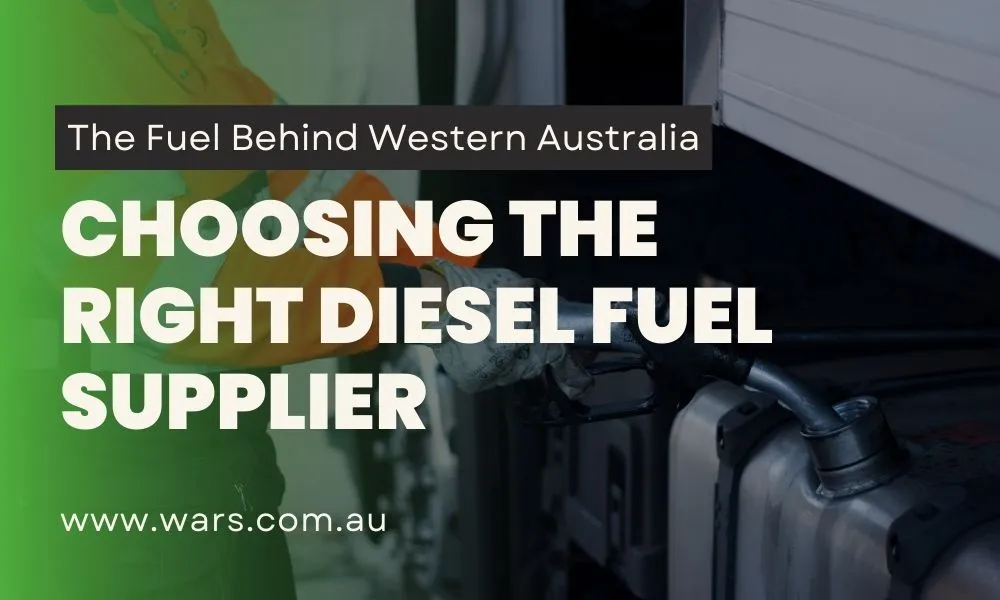
Diesel fuel is the lifeblood of Western Australia’s industrial and commercial sectors, powering a multitude of machinery and vehicles that keep the region moving forward. The importance of selecting the right diesel fuel supplier cannot be overstated. It is not merely about fuelling your operations; it’s about ensuring efficiency, reliability, and adherence to environmental standards. In this article, we delve into the crucial aspects of choosing a diesel fuel supplier that aligns with the unique needs of Western Australia Refuelling Services (WARS).
Understanding Your Diesel Fuel Needs:
When considering a diesel fuel supplier, it’s essential to identify the specific fuel requirements of your operations. Different machinery and vehicles may require different types of diesel, and understanding these requirements is the first step towards making an informed decision.
Analysing your consumption and usage patterns is key to determining the volume of diesel required. This information helps in negotiating better deals with suppliers, ensuring that you receive an adequate and cost-effective supply tailored to your needs.
Environmental regulations play a significant role in diesel fuel usage. Suppliers that align with or exceed these regulations demonstrate a commitment to environmental responsibility. Understanding and complying with these regulations are crucial for the sustainable growth of your operations.
Types of Diesel Fuel Suppliers:
Local fuel suppliers often offer a more personalised service, understanding the unique demands of the Western Australian market. Their proximity can lead to quicker response times and better adaptability to local conditions.
National and international suppliers bring scalability and potentially lower costs. However, it’s essential to weigh these advantages against the potential challenges of dealing with a larger, possibly less agile, supplier.
Consider the distribution network of a supplier. Reliable logistics and multiple delivery options contribute to a smoother refuelling process, preventing disruptions in your operations.
Considerations for Choosing a Supplier:
While cost is a crucial factor, it shouldn’t be the sole determinant. Assess pricing alongside the overall value, considering factors like reliability, delivery efficiency, and additional services.
Ensure that your chosen supplier adheres to industry standards for diesel fuel quality. High-quality fuel not only improves efficiency but also prolongs the life of your machinery.
Timely and reliable delivery is paramount in the industrial sector. Choose a supplier with a proven track record of on-time deliveries, preventing downtime in your operations.
A responsive and supportive customer service team ensures a smooth relationship with your supplier. In times of need, having a reliable point of contact can make a significant difference.
Sustainability and Environmental Concerns:
As environmental consciousness grows, suppliers adopting emission standards and green initiatives contribute to a more sustainable and responsible supply chain.
Exploring sustainable and low-carbon diesel options not only aligns with environmental goals but also positions your operations as socially responsible—a factor that can positively impact your brand image.
Choose a supplier who actively embraces environmental responsibility. This commitment should be reflected in their practices, policies, and long-term sustainability goals.
Assessing Supplier Reputation:
Online reviews and testimonials provide insights into the experiences of other businesses. Look for patterns and consistent positive feedback to gauge a supplier’s reputation.
Consulting with industry peers can offer valuable firsthand experiences and recommendations. A supplier with a positive reputation among peers is likely to be a reliable choice.
A supplier’s past performance and history in the market are indicative of their reliability. Choose a supplier with a proven track record of consistency and longevity.
Contract Terms and Agreements:
Negotiate contract terms that align with your business goals. Consider the flexibility of contract lengths, allowing for adjustments as your operational needs evolve.
Understanding termination and renewal clauses is crucial for flexibility and avoiding potential legal complications. Clearly defined terms protect both parties and foster a transparent working relationship.
Transparent billing and payment terms streamline the financial aspect of your partnership. Clearly defined terms help in avoiding misunderstandings and maintain a healthy business relationship.
Compatibility and Equipment:
Compatibility between the supplied diesel and your machinery/vehicles is vital. Choose a supplier whose products are compatible with your equipment, preventing potential damage and performance issues.
Evaluate the delivery methods and equipment used by the supplier. Modern and efficient delivery methods contribute to a seamless refuelling process, minimising operational disruptions.
Understand the storage and handling requirements of the supplied fuel. Compliance with safety standards and efficient handling practices contribute to a safer working environment.
Safety and Compliance:
Prioritise suppliers who adhere to rigorous safety protocols and regulations. Safety is paramount in the fuel industry, and a supplier with a strong commitment to safety enhances the overall reliability of their services.
Ensure that your chosen supplier complies with hazardous material laws. Non-compliance can lead to legal complications and disruptions in your operations.
Assess the supplier’s emergency response procedures and spill prevention measures. A proactive approach to handling emergencies safeguards your operations and the environment.
Selecting the right diesel fuel supplier is a multifaceted decision that goes beyond cost considerations, but it doesn’t need to be complicated. With Western Australia Refuelling Service, you can ensure a partnership that not only fuels your operations but also contributes to their efficiency, sustainability, and long-term success.
